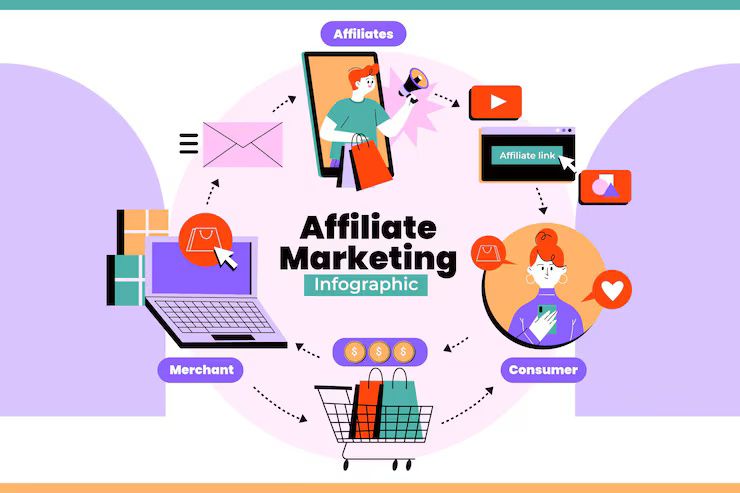Explore the Basics of Affiliate Marketing: A Complete Guide for Beginners
Affiliate marketing is a performance-based digital strategy where individuals or organizations promote products or services of other companies and earn a commission for each successful referral or action. It exists as a bridge between brands seeking customers and publishers who have access to audiences interested in specific products or services.
This marketing model began gaining traction in the late 1990s, evolving with the rise of e-commerce and online advertising. Today, it forms a major part of global digital marketing, influencing how companies expand their reach and how online creators monetize their platforms.
At its core, affiliate marketing relies on partnerships. The advertiser provides links or codes to affiliates, who promote them through websites, blogs, social media, or emails. When users take predefined actions—such as signing up, downloading, or purchasing—the affiliate earns a reward.

Importance
Affiliate marketing matters more than ever in 2025 due to the growth of digital commerce and influencer-driven marketing. Its importance can be summarized through several key aspects:
-
Scalability and Accessibility: Anyone with a digital presence—such as a website, YouTube channel, or social account—can participate.
-
Performance-Based Structure: It’s built on measurable outcomes, ensuring that efforts align with real engagement and conversions.
-
Mutual Benefit: It supports both brands and affiliates by connecting potential customers with relevant content.
-
Global Reach: As online trade grows, affiliate marketing connects markets across borders, enabling global promotion.
-
Education and Transparency: Modern affiliate platforms provide detailed analytics, helping affiliates understand consumer behavior.
This system solves challenges for advertisers who need efficient promotion channels and for creators looking for structured ways to monetize their content ethically.
Recent Updates
The landscape of affiliate marketing has evolved rapidly over the past year (2024–2025) due to technological and regulatory changes. Some of the most notable updates include:
-
AI-driven analytics (2024): Artificial intelligence tools are now used to track user behavior, optimize campaigns, and predict conversion rates more accurately.
-
Influencer integration (2025): Social media influencers and content creators are now considered key affiliate partners, blending content and performance marketing.
-
Privacy and tracking changes (2024): The phase-out of third-party cookies has shifted the industry toward first-party data and ethical data collection.
-
Mobile-first strategies (2025): More affiliates are optimizing for mobile audiences, as over 60% of affiliate clicks now come from smartphones.
-
Diversification of niches (2025): Affiliate marketing is expanding beyond e-commerce into sectors like finance, travel, education, and sustainable technology.
Reports from digital marketing analysts show that affiliate programs continue to represent one of the fastest-growing forms of online promotion, contributing significantly to global e-commerce revenues.Laws or Policies
Affiliate marketing operates under multiple layers of regulation to ensure transparency and consumer protection. These laws vary by country but share several common principles:
-
Disclosure Requirements: In regions like the United States, the Federal Trade Commission (FTC) mandates that affiliates clearly disclose their partnership status to audiences when promoting products or services.
-
Data Privacy Laws: The General Data Protection Regulation (GDPR) in Europe and similar frameworks elsewhere require affiliates to manage user data responsibly.
-
Advertising Standards: Many countries enforce laws against misleading claims, ensuring affiliates represent products accurately.
-
Tax Compliance: Affiliates are required to report income generated through digital partnerships according to their local tax regulations.
-
Cookie and Consent Policies: New international guidelines demand explicit user consent before tracking affiliate referrals, aligning with updated online privacy norms.
Together, these regulations encourage ethical marketing practices, creating a trustworthy environment for both consumers and content creators.
Tools and Resources
Several modern tools and platforms make affiliate marketing easier to learn, manage, and optimize. Beginners can use these to understand their audiences and measure results effectively.
-
Affiliate Network Platforms: Systems such as CJ Affiliate, Impact, and Rakuten provide access to numerous affiliate programs in different industries.
-
Link Tracking Software: Tools like Voluum or ClickMeter help affiliates monitor clicks, conversions, and performance metrics.
-
Analytics Dashboards: Google Analytics and Matomo allow users to assess website traffic and engagement linked to affiliate efforts.
-
Keyword Research Tools: Platforms such as Ahrefs, Semrush, and Google Keyword Planner help identify high-value topics and target audiences.
-
Content Management Tools: WordPress, Notion, and Trello assist in planning and publishing consistent affiliate-related content.
-
Educational Platforms: Online learning portals like Coursera, Udemy, and HubSpot Academy offer beginner courses on ethical and data-compliant affiliate strategies.
Example Table: Key Components of Affiliate Marketing
| Component | Description | Example Application |
|---|---|---|
| Merchant/Advertiser | The company offering the product or service | A travel agency promoting bookings |
| Affiliate/Publisher | The individual or entity promoting the product | A blogger recommending destinations |
| Affiliate Network | Platform connecting advertisers and affiliates | Impact or Rakuten Advertising |
| Consumer | The end-user who engages or purchases via affiliate links | A reader who clicks and books a trip |
| Tracking System | Technology used to record affiliate actions and rewards | Cookie or first-party tracking |
FAQs
What is affiliate marketing in simple terms?
Affiliate marketing is a partnership model where a person promotes a company’s product or service and earns a commission for each successful action—such as a sale or registration—through their referral link.
Is affiliate marketing the same as influencer marketing?
Not exactly. Influencer marketing focuses on brand awareness, while affiliate marketing is performance-based, rewarding specific actions or conversions driven by measurable engagement.
Can anyone start affiliate marketing?
Yes. Individuals with online platforms like websites, blogs, or social media pages can join affiliate programs, provided they follow ethical and legal guidelines.
What are common mistakes beginners make?
Common issues include not disclosing partnerships, choosing irrelevant products for their audience, and neglecting performance analytics. These can reduce credibility and efficiency.
How is affiliate performance tracked?
Tracking systems use unique links, cookies, or identifiers to monitor clicks and conversions. Many platforms now use privacy-compliant first-party tracking systems.
Conclusion
Affiliate marketing continues to be a vital component of the modern digital economy, blending content creation, analytics, and ethical promotion. For beginners, understanding its structure, compliance rules, and evolving technology is essential to long-term success.
The future of affiliate marketing in 2025 emphasizes transparency, responsible data handling, and sustainable partnerships. As artificial intelligence and mobile optimization become standard, affiliates who adapt to these trends will find opportunities to grow ethically and effectively.







